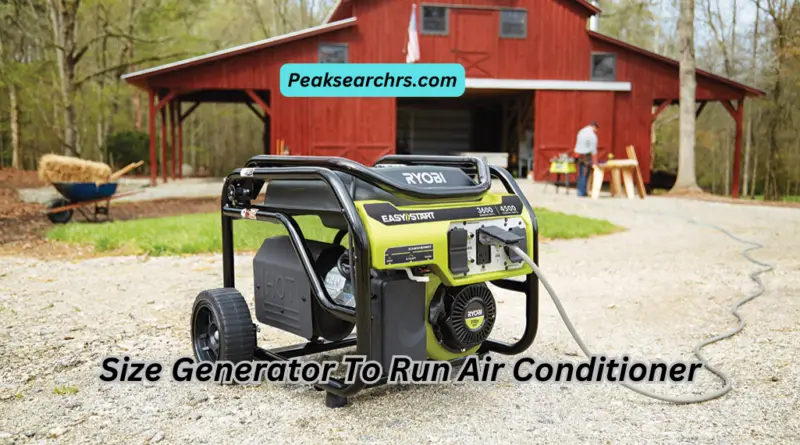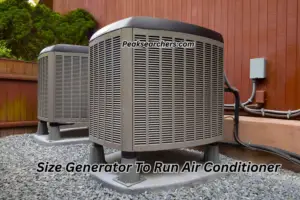What Size Generator To Run Air Conditioner? A Detailed Information
Welcome to our comprehensive guide on choosing the right Size Generator To Run Air Conditioner. Whether you’re preparing for a power outage or planning to use your AC in remote locations, selecting the appropriate generator is crucial for optimal performance.
In this article, we will provide you with valuable insights and recommendations to help you make an informed decision. I also have the same Generator. It provides enough energy for my AC to give chills.

Understanding Generator Capacity
Generators come in various sizes and power capacities, which are typically measured in watts. It’s essential to understand the power requirements of your air conditioner and ensure that your generator can meet those demands.
Determining the ideal generator size to run an air conditioner involves considering multiple factors such as the AC’s wattage, starting current, and any additional appliances you wish to power simultaneously.
Calculating Air Conditioner Wattage
To begin, let’s calculate the wattage required to run your air conditioner. You can find this information on the AC unit’s nameplate or in the user manual.
Look for the “power” or “wattage” rating specified by the manufacturer. It’s crucial to note that air conditioners have two power ratings: the running (or rated) power and the starting (or surge) power.
Running Power vs. Starting Power
Running power refers to the amount of electricity needed to keep the air conditioner running smoothly once it has started.
On the other hand, the starting power, also known as the surge power, is the additional energy required to initiate the compressor and other components when the AC unit is first turned on.
Starting power is typically higher than the running power and lasts for a brief moment.
Factoring in the Starting Power
When choosing a generator, it’s crucial to consider the starting power requirements of your air conditioner. The initial surge of power needed to start the AC unit can be up to three times higher than the running power.
Failing to account for this surge may lead to your generator overloading or tripping the circuit breaker. To prevent such issues, it’s essential to select a generator with sufficient starting power capacity.
Choosing the Right Generator Size
Now that we understand the importance of both running and starting power, let’s determine the appropriate generator size to run your air conditioner. We’ll outline a step-by-step process to help you make an accurate calculation.
Step 1: Identify the Running Power
Refer to your air conditioner’s nameplate or user manual to find the running power, typically measured in watts. Suppose your AC unit has a running power of 1,200 watts.
Step 2: Determine the Starting Power
As mentioned earlier, the starting power is usually higher than the running power. It’s crucial to determine this value accurately to avoid any generator performance issues.
If your air conditioner has a starting power of 3,000 watts, multiply the running power by three (3,000 = 1,200 x 3) to estimate the starting power requirement.
Step 3: Account for Additional Appliances
Consider any other appliances or devices you plan to power simultaneously with your air conditioner. Sum up their power ratings and include them in your total wattage calculation.
For example, if you want to run a 500-watt fan alongside your air conditioner, add it to the total power requirement.
Step 4: Calculate the Total Wattage
Add the running power, starting power, and power requirements of additional appliances to find the total wattage. In our example, the total wattage would be 3,500 watts (1,200 + 3,000 + 500).
Selecting the Generator Capacity
Now that you know the total wattage required to power your air conditioner and additional devices, it’s time to choose the right generator capacity. Generators come in different sizes, typically ranging from portable models to larger standby units.
Portable Generators
Portable generators are a popular choice for powering air conditioners in various settings, such as camping trips or during temporary power outages. They are compact, lightweight, and offer sufficient power for smaller AC units.
When selecting a portable generator, ensure it has a running wattage capacity that meets or exceeds your air conditioner’s total wattage requirement. It’s also important to consider the starting wattage to avoid overloading the generator during the AC’s initial startup phase.
Standby Generators
If you’re looking for a more permanent solution to power your air conditioner, standby generators are worth considering. These units are typically installed outside your home and can provide power during prolonged outages.
Standby generators offer higher power capacities and can handle larger air conditioners along with other appliances. Consulting with a professional electrician is recommended to determine the appropriate standby generator size based on your specific needs.
Additional Considerations
While generator capacity is a vital aspect to consider when powering your air conditioner, there are a few additional factors to keep in mind:
Fuel Type
Generators can run on various fuel types, including gasoline, diesel, propane, and natural gas. Each fuel type has its advantages and considerations.
Ensure the chosen generator’s fuel availability is convenient for your situation and consider factors such as fuel storage requirements, emissions, and cost.
Noise Level
If noise is a concern, especially in residential areas or during outdoor activities, opt for generators with lower noise levels. Look for units specifically designed for quiet operation, as they often have built-in noise reduction features.
Safety Precautions
When operating a generator, it’s crucial to prioritize safety.
Follow the manufacturer’s instructions and guidelines to ensure proper usage, including proper ventilation, avoiding carbon monoxide buildup, and preventing electrical hazards.
If you’re unsure about any safety aspect, consult a professional or reach out to the generator manufacturer for guidance.
Also Read: How to Clean a Portable Air Conditioner: A Comprehensive Guide
FAQ’s
Which generator is suitable for running a 1.5-ton air conditioner?
When it comes to running a 1.5-ton air conditioner, it is important to select a generator with adequate power capacity. The power requirements of an air conditioner are typically measured in terms of watts or amps. To determine the suitable generator, you need to consider the starting watts and running watts of the air conditioner unit.
A 1.5-ton air conditioner typically requires around 3500-5000 starting watts and 1200-1800 running watts. Based on these power requirements, you have a few options for generators:
- Portable Generators: Look for a portable generator with a wattage rating between 3500 and 5000 starting watts, and 1200 and 1800 running watts. Ensure that the generator has the necessary outlets compatible with your air conditioner’s plug type.
- Inverter Generators: Inverter generators are known for their stable power output and suitability for sensitive electronic devices. Look for an inverter generator with similar wattage ratings as mentioned above, ensuring it can handle the starting and running power needs of your air conditioner.
- Standby Generators: Standby generators are a more permanent power solution. If you’re looking for a standby generator to power your 1.5-ton air conditioner, consult an electrician or generator specialist who can assess your specific power requirements and recommend a suitable generator size for your needs.
Remember to carefully review the specifications and consult with professionals if needed to ensure that the generator you choose can handle the power demands of your 1.5-ton air conditioner.
Can a 2.5 kW generator run an air conditioner?
The ability of a 2.5 kW generator to run an air conditioner depends on the power requirements of the specific air conditioner unit. It is important to check the wattage rating of the air conditioner to determine if it can be powered by a 2.5 kW generator.
Typically, air conditioners require both starting watts and running watts. Starting watts are the initial power surge needed to start the compressor while running watts refer to the continuous power consumption during operation.
To assess if a 2.5 kW generator can run your air conditioner, compare the wattage requirements of the air conditioner with the generator’s capacity. If the starting and running watts of your air conditioner are lower than 2.5 kW (2500 watts), then a 2.5 kW generator may be sufficient to power it. However, it is recommended to consult the manufacturer’s specifications or an electrician to ensure compatibility and avoid potential issues.
Can I use any generator to power my air conditioner?
Not all generators are suitable for powering air conditioners. Air conditioners have specific power requirements, and it is important to choose a generator that can meet those needs.
When selecting a generator for your air conditioner, consider the following factors:
- Power Capacity: Ensure that the generator has enough power capacity to handle the starting watts and running watts of your air conditioner. Check the manufacturer’s specifications for the power requirements of your specific air conditioner model.
- Stability of Power Output: Air conditioners are sensitive to fluctuations in power. It is recommended to use generators with stable power output, such as inverter generators, to ensure smooth operation and avoid potential damage to the air conditioner’s components.
- Compatibility: Check the outlets and plugs on the generator to ensure they are compatible with your air conditioner. Some air conditioners may require specific types of plugs, so verify compatibility before making a purchase.
- Safety Considerations: Generators should be used in accordance with safety guidelines. Ensure proper grounding, avoid overloading the generator, and follow all safety precautions provided by the manufacturer.
In summary, it is essential to select a generator that matches the power requirements, provides stable power output, and is compatible with your air conditioner to ensure safe and reliable operation.
How do I calculate the power requirements for my air conditioner?
Calculating the power requirements for your air conditioner involves determining the appropriate wattage needed to operate the unit effectively. Here’s a step-by-step guide to help you calculate the power requirements:
- Check the air conditioner’s specifications: Refer to the manufacturer’s documentation or product manual of your air conditioner. Look for information on the power consumption, typically provided in watts (W) or amps (A).
- Identify the running wattage: The running wattage represents the continuous power consumption of the air conditioner during normal operation. It is usually lower than the starting wattage, which is the power needed to initially start the compressor.
- Estimate the starting wattage: Air conditioners often require an initial surge of power to start the compressor. This surge is higher than the running wattage. Check the air conditioner’s specifications or consult the manufacturer to obtain the starting wattage.
- Calculate the total power requirements: To determine the total power requirements of your air conditioner, add the running wattage to the starting wattage. This sum will give you the approximate power in watts that your generator needs to provide to run the air conditioner.
Remember to consider any additional appliances or devices that may be connected to the generator simultaneously and account for their power requirements as well.
By accurately calculating the power requirements of your air conditioner, you can select a generator with sufficient wattage to power it effectively and avoid overloading the generator. If you have any doubts or need precise calculations, it is recommended to consult the manufacturer or seek assistance from a qualified electrician.
Are inverter generators quieter than portable generators?
Yes, inverter generators are generally quieter than portable generators. This is because they utilize advanced technology, including electronic inverters, to produce a more stable and controlled power output.
In addition, inverter generators have variable engine speeds that adjust based on power demand, resulting in reduced noise levels. However, noise levels can vary between different models and brands, so it’s important to review specifications and consider personal noise preferences when selecting a generator.
What size generator is needed to run a 3-ton AC unit?
To determine the appropriate generator size to run a 3-ton air conditioning (AC) unit, you need to consider the power requirements of the AC unit. Here’s a general guideline:
- Check the power requirements: Look for the power specifications of the 3-ton AC unit. It is usually provided in terms of running watts and starting watts. Refer to the manufacturer’s documentation or product manual for this information.
- Calculate the total power requirements: Add the running watts and starting watts of the AC unit to obtain the total power requirements. This sum will give you an approximate wattage that the generator needs to provide to run the AC unit.
- Select a generator size: Based on the total power requirements, choose a generator size to run an air conditioner with a wattage rating that exceeds the total power requirements of the AC unit. It is generally recommended to have a generator with a capacity that is 20-25% higher than the total power requirements for optimal performance.
For a 3-ton AC unit, the power requirements can vary depending on factors such as the efficiency of the AC unit and any additional power needs (such as fans or lights) connected to the generator.
It is essential to refer to the specific power requirements of your AC unit and consult the manufacturer’s guidelines or seek assistance from a qualified electrician to ensure accurate calculations and selection of the appropriate generator size.
Also Read: How to Fix Air Conditioner Leaking Water Inside Car? A Comprehensive Guide
Conclusion
Selecting the right generator size to run your air conditioner is essential for seamless operation and avoiding any electrical issues.
By calculating the running and starting power requirements, accounting for additional appliances, and considering generator capacity, you can confidently choose a generator that meets your needs.
Remember to prioritize safety precautions and follow the manufacturer’s guidelines for optimal performance.
If you have any further questions or need assistance in choosing the right generator for your air conditioner, feel free to reach out to our team of experts.
Stay cool and prepared for any power situation with the perfect generator for your needs!



